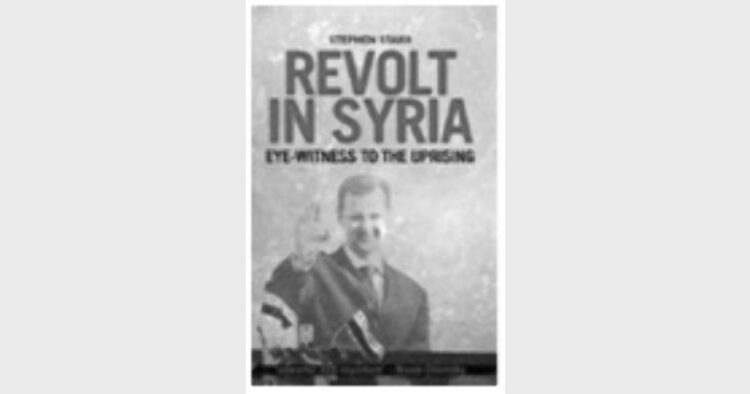Nidhi Mathur
Revolt in Syria, Stephen Starr, Hurst & Company, London, Pp 226, £ 14.99
IT was a revolt in 2011 on Baba Amr by the rebels of the so-called Free Syria Army – mostly defected soldiers from the Syrian regular army – to ward of the brutal attack by government forces that failed because the rebels comprised a mostly disorganised group with limited capabilities.
The seeds of the protest in Syria were innocuous enough. In early March 2011, a number of youth in the southern city of Deraa, imitating what had happened in Tunisia and Egypt, wrote anti-government graffiti on the walls of a school. They were caught by the principal and the mukhabarat, the secret service, taken into custody, beaten and their nails pulled out. The mothers of these youngsters approached the police but were rebuked. So they took to the streets and were arrested as was to be expected. One night, former President Hafez al-Assad’s statue was pulled down by the agitators and soon anti-government uprisings spread to the four corners of the country.
For a long time Syria has been a country more feared than understood. A police state with links to Iran and ill-regarded by most in the Western political world, it is, nevertheless, known to those who have visited it for its famous hospitality, sumptuous food and spectacular historical sites. Those who stay longer become familiar with the intricacies of the country’s religious make-up, the taboo topics and the economic difficulties being faced by the vast majority. But very few know of Syria’s complex social make-up or how the Syrians lived or thought as the country teetered on the brink of civil war following the 2011 revolt. Two weeks after the outbreak of protests, President Bashar al-Assad gave a speech in Parliament announcing the end of emergency laws which had been enforced in 1963. This meant, in theory, an end to arrest and detention without a warrant, but this was contradicted almost at once with a full-scale military assault.
Civil strife and division grew, examples of which are given in detail by the author of this book and who stayed in Syria for four years which helped him to present unusual information on daily life in the capital city of Damascus; an understanding of the ills plaguing Syrian society; knowledge of the complete immobility of state institutions and sympathetic insight into the divided loyalties as the country faced a civil war; and understanding of why many Syrians cling to these institutions for stability and jobs.
The author narrates his meeting with a Kurd who made a startling revelation. Incidentally Kurds are Sunnis like the majority of the Sunni population but not Arab and at perpetual war with the government as they want to carve out a Kurdish heartland in territories taken from Syria, Iraq and Turkey. This Kurd was named Mohammad and he said to the author, “You have heard of the saying that your enemy’s enemy is your friend – many Kurds like Israel.” The Kurds are terrified of an Islamist-oriented government. Another strange phenomenon in Syrian politics is that the minorities who comprise 25 per cent of the overall population and include Christians, Shias, Alawites and Druze take the side of the Bashar al-Assad’s regime and are against the rebels.
The social customs in Syria are quite similar to those seen in India. The author relates an amusing incident. A Syrian youth wanted to marry a girl from a family that was not well-to-do but not poor either. He went to the girl’s house to seek their daughter’s hand in marriage. The father asked him if had had a house, the boy replied that he had one in Qudsayiah suburb, to which the father’s reply was “We were thinking about a house in Rowda [central Damascus with French colonial era houses].” The father then asked if he possessed a car and when the boy replied that he had a Kia, the father’s response came in a disappointed tone, “We were thinking about an Audi or Volkswagon or something like that.” There was no marriage!
The best part of the book is the author’s eye for detail, his flair for telling an anecdote with vivid details and his care in interviewing people drawn from all walks of life.
(C. Hurst & Co. (Publishers) Ltd, 41 Great Russell Street, London, WC1 3PL; www.hurstpub.co.uk)














Comments